Cam Newton joins select group of black QBs to reach Super Bowl

On Sunday, Cam Newton led the Carolina Panthers to a 49–15 victory over the Arizona Cardinals in the NFC Championship Game, sending his team to Super Bowl 50.
Newton finished the game 19 of 28 for 335 yards with two touchdowns and one interception. He also rushed for 47 yards and two touchdowns.
When Newton takes the field at Levi's Stadium on Feb. 7, he'll be looking to bring the Panthers their first championship. He will also become the sixth black quarterback to start in a Super Bowl. Including this season, each of the last four Super Bowls has featured a black quarterback.
Here's a look at the previous five black quarterbacks to start the league's title game.
Doug Williams (Super Bowl XXII)
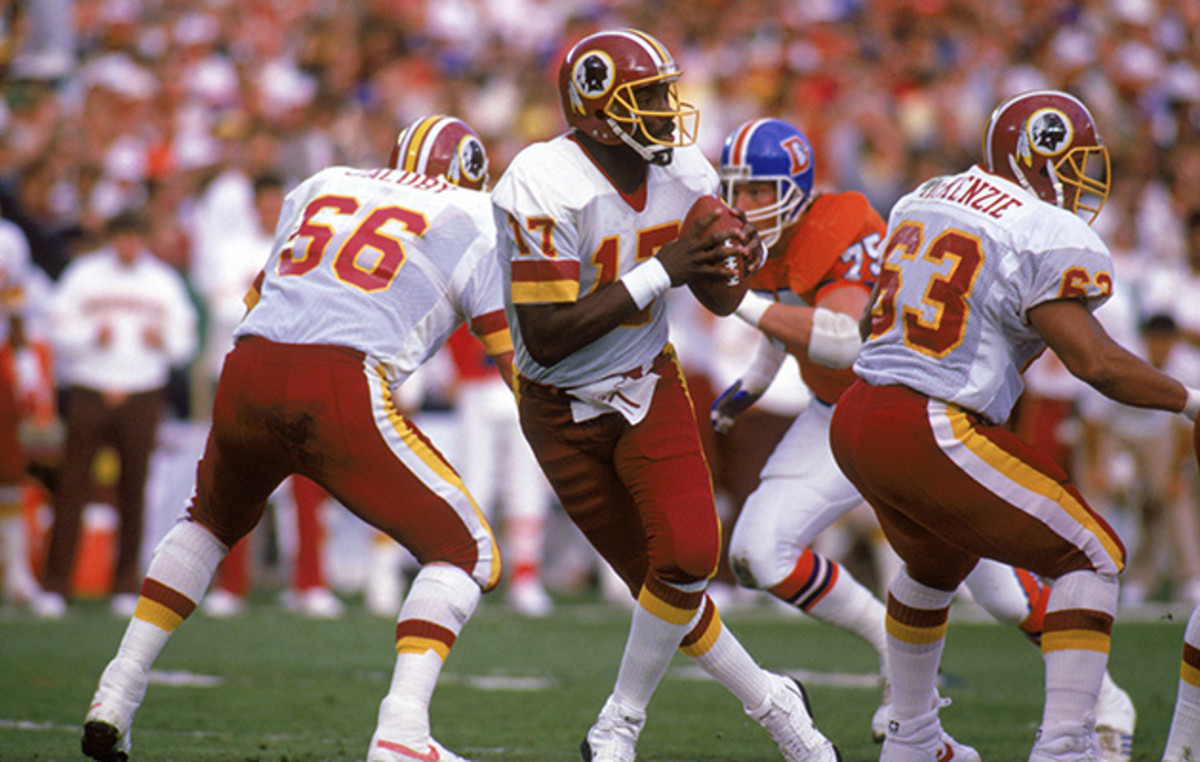
Washington Redskins quarterback Doug Williams made history during the 1987 NFL season when he became the first black quarterback to play in a Super Bowl.
Ahead of the game, Williams's historical achievement became one of the game's biggest storylines, though it is disputed whether a reporter actually asked him the question, “How long have you been a black quarterback?” In an interview with ESPN in 2013, Williams discussed the infamous question.
"I just remember, 'How long have you been a black quarterback?'" Williams told ESPN's Greg Garber. "And that's the only question I heard 25 years ago.
"Lo and behold, I really understood where he was coming from, and I think he just got caught up in the moment and the question did not come out the way he would have loved for it to come out. But that's the way it came out. It's obvious that I could have not changed from being black that quick, so I had to be black all my life."
During the 1987 season, Williams had to compete with Jay Schroeder for starting quarterback duties, but he turned in one of the greatest quarterbacking performances in Super Bowl history.
After John Elway's Broncos took a 10–0 first–quarter lead, Washington scored 42 unanswered points behind 340 yards through the air and four passing touchdowns from Williams, who was named MVP of the game. Washington's 42–10 victory was the franchise's second Super Bowl title.
Steve McNair (Super Bowl XXXIV)
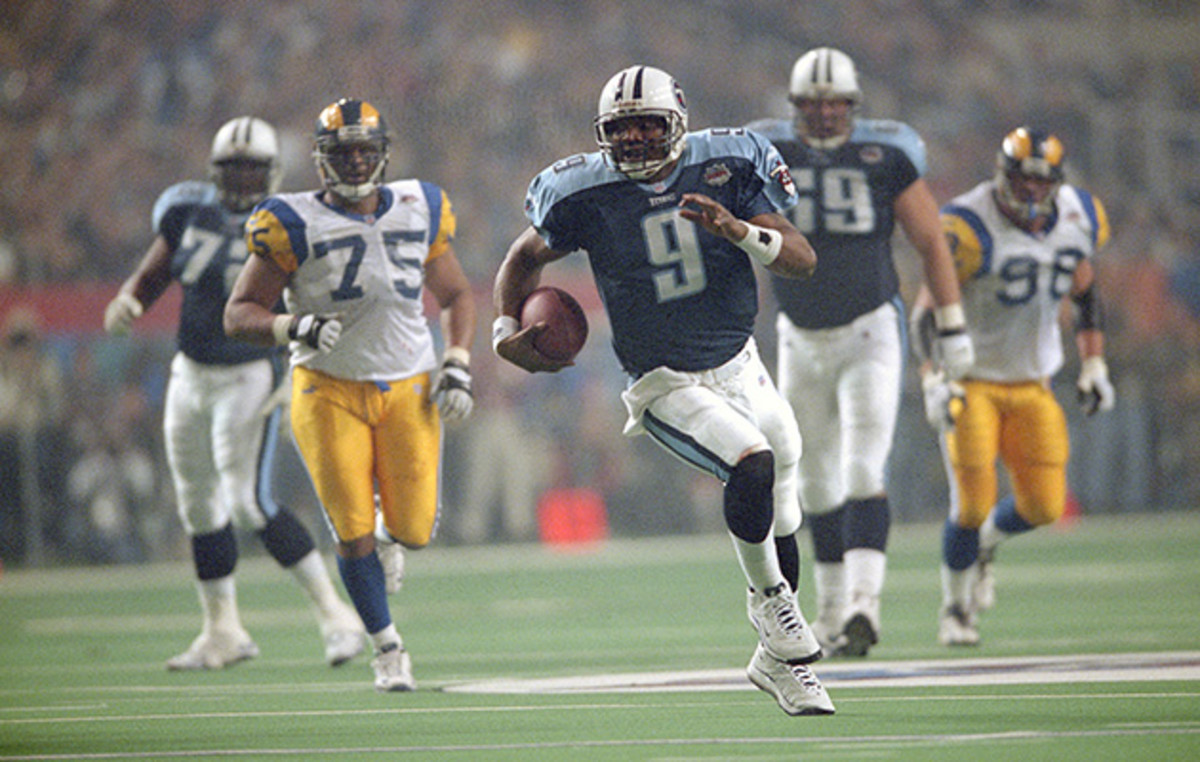
After Williams made history, more than a decade would pass before another black quarterback started a Super Bowl. Steve McNair became the second black quarterback to make the game during the 1999 season.
After finishing the year 13–3, McNair's Titans made the Super Bowl following a memorable postseason run. The “Music City Miracle” vaulted the Titans over the Bills in the wild–card round, and Tennessee won road games over the Colts and Jaguars to reach Super Bowl XXXIV.
In the Super Bowl, Tennessee faced the St. Louis Rams and the “Greatest Show on Turf.” The Rams, who were a strong favorite to win, jumped out to a 16–0 lead, but McNair rallied the Titans, tying the game at 16 late in the fourth quarter. The Rams quickly regained the lead on a long Kurt Warner touchdown pass, but down a touchdown, McNair led the Titans down the field and put the team in excellent scoring position after miraculously escaping from pressure.
On the last play of the game, McNair found Kevin Dyson over the middle near the goal line, but the Titans receiver was tackled one yard shy of the endzone.
In one of the more memorable performances by a losing Super Bowl quarterback, McNair finished the game 22 of 36 for 214 yards. He also rushed for 64 yards.
Donovan McNabb (Super Bowl XXXIX)
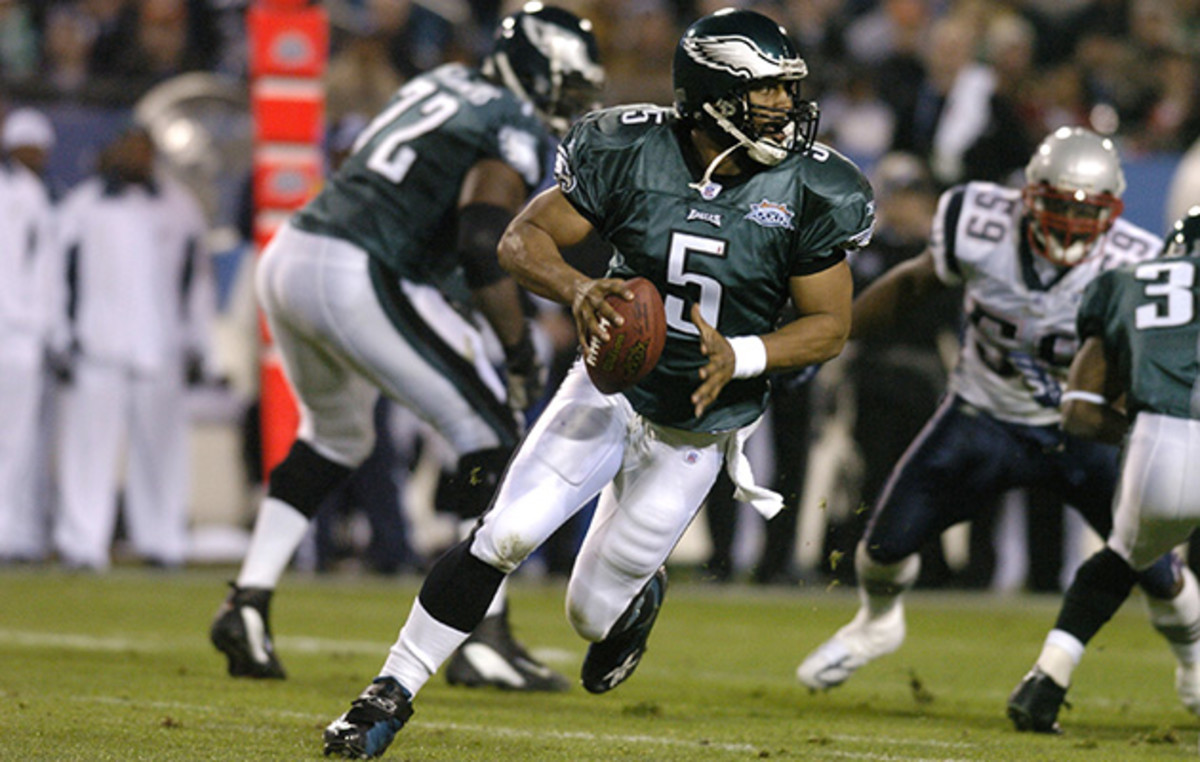
Five years after McNair's heroic performance, Donovan McNabb took on Tom Brady and the New England Patriots in Super Bowl XXXIX after finishing the season 13-3 and winning an NFC East division title.
The Patriots had won two of the previous three Super Bowls. With star receiver Terrell Owens injured, McNabb led the Eagles to postseason victories over the Minnesota Vikings and the Michael Vick-led Atlanta Falcons.
Owens returned for the Super Bowl, where Philadelphia struck first on a six–yard pass from McNabb to L.J. Smith. The Patriots countered with a touchdown of their own and eventually took the lead. With New England leading by ten with 8:40 to go, McNabb tried to muster an Eagles rally. He connected with receiver Greg Lewis on a 30-yard touchdown pass with just 1:48 left in the game, but Philadelphia fell short. New England won the game 24–21, their third Super Bowl victory in four years.
McNabb went 30 of 51 for 357 yards with three touchdowns and three interceptions in his only career Super Bowl appearance.
Colin Kaepernick (Super Bowl XLVII)
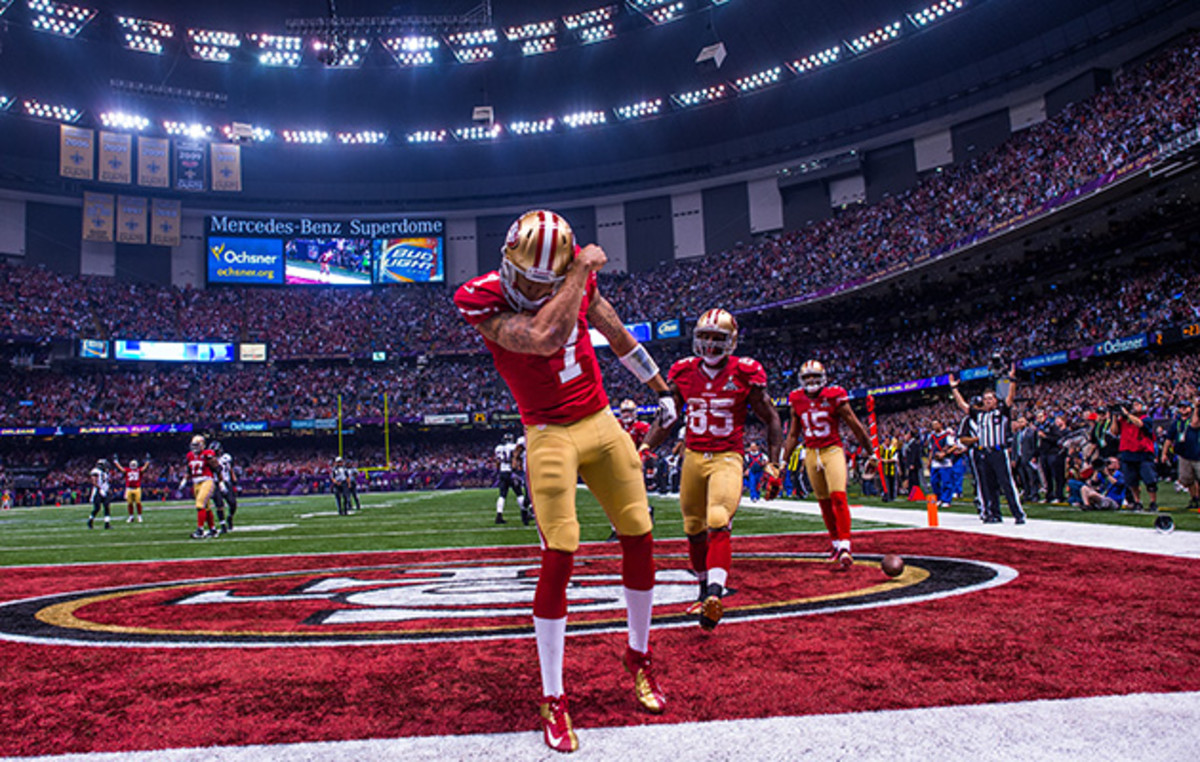
Colin Kaepernick supplanted Alex Smith as the 49ers' starting quarterback during the middle of the 2012 season. Even when Smith returned from a concussion, Kaepernick remained the starter and led the 49ers into the playoffs.
The second–year quarterback had a historic playoff run, using his legs and arm to move the ball down the field. In his first playoff game, against the Green Bay Packers, the 49ers won 45–31 behind Kaepernick's 181 rushing yards, a new NFL single-game rushing record for a quarterback in a playoff game. In the NFC Championship Game, the 49ers then beat the Atlanta Falcons on the road to advance to the Super Bowl.
In the Super Bowl, the Ravens jumped out to a big lead and were ahead 28–6. But following a long power outage in the stadium, Kaepernick led a furious 49ers rally, closing the gap to two points with 9:57 remaining. But San Francisco's comeback ultimately fell short, with Baltimore prevailing 34–31.
Kaepernick completed 16 of 28 passes for 302 yards, a touchdown and an interception. He also added 62 yards and a score on the ground.
Russell Wilson (Super Bowls XLVIII, XLIV)
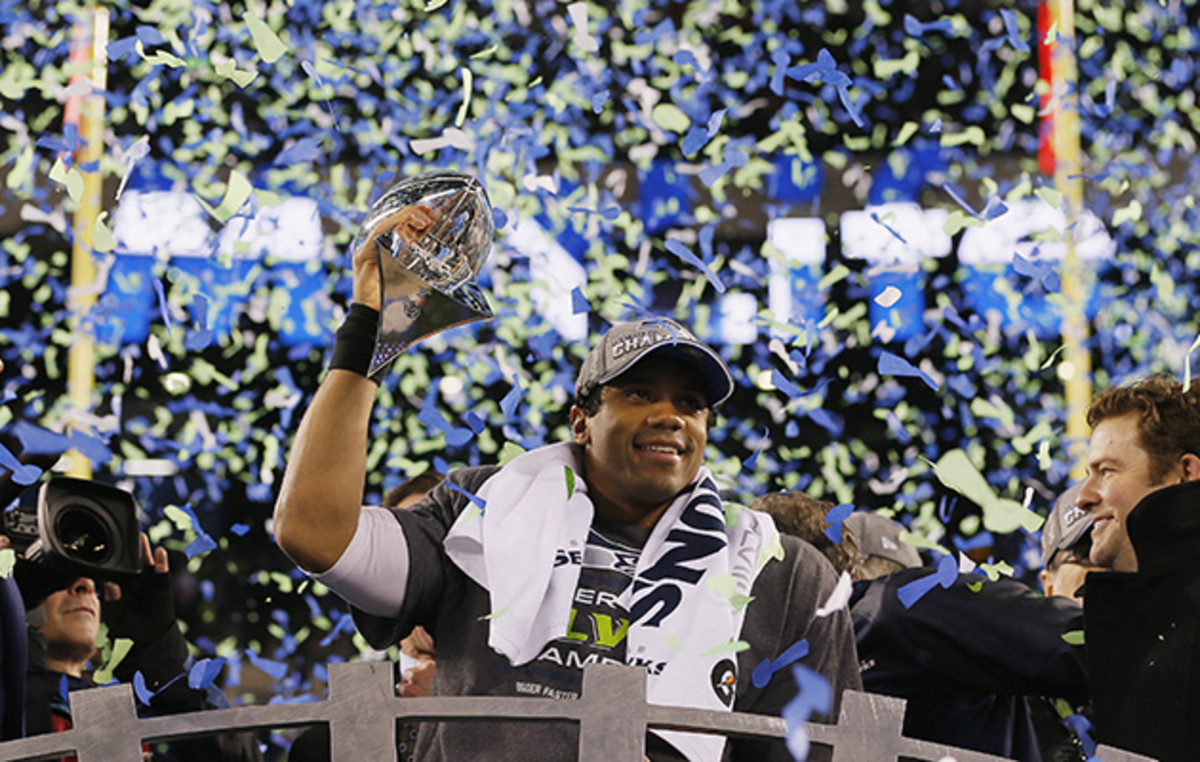
In his second and third years in the NFL, Russell Wilson led the Seattle Seahawks to two Super Bowl appearances.
During the 2013 season, the Seahawks met Peyton Manning and the Denver Broncos in Super Bowl XLVIII. The game was an all-around dominant performance from the Seahawks' vaunted defense, which forced four turnovers and led the team to a 43–8 win. But Wilson also played well, finishing the game 18 of 25 for 206 yards and two touchdowns.
The following year, the Seahawks returned to the Super Bowl, this time against Tom Brady and the Patriots. Unlike the previous year, Super Bowl XLIX was extremely tight. Wilson threw two touchdowns, and the Seahawks took a ten point lead into the fourth quarter.
But New England responded with two touchdowns to take the lead with two minutes remaining. Down four points with two minutes to go, Wilson guided the Seahawks down the field to New England's one–yard line. But with just seconds remaining, Wilson was intercepted at the goal line by Patriots defensive back Malcolm Butler, giving the Patriots a 28–24 victory.
